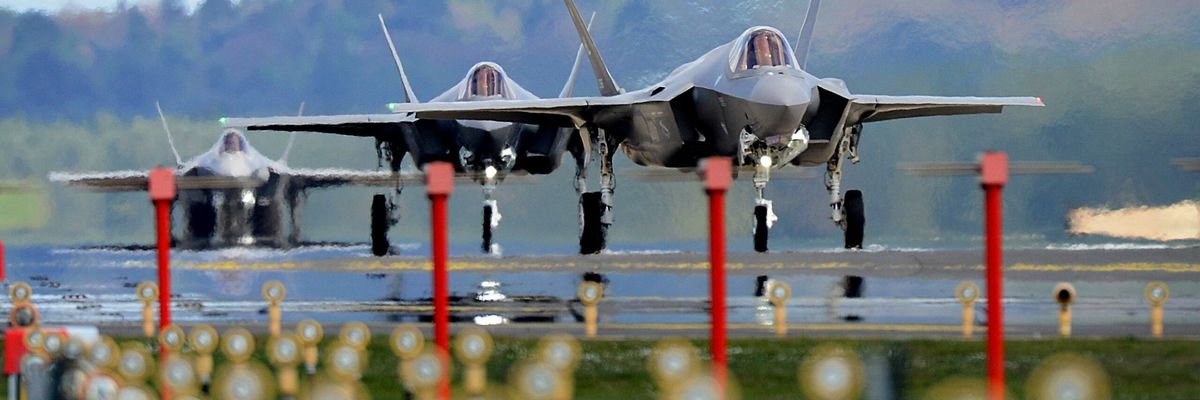Defense News reported on Wednesday that defense contractor Pratt & Whitney is suspending its deliveries of new F-35 engines, following a setback on a Texas runway last month. Video from the December 15 incident shows a Lockheed F-35B Lightning II crashing during a quality check and the pilot ejecting.
Last Friday, in the aftermath of the incident, Defense News first reported that Lockheed Martin had “announced it halted acceptance flights and deliveries of new F-35 Joint Strike Fighters” due to the ongoing investigation. As a result, Lockheed Martin delivered seven fewer aircraft than the 148 that they were contracted to deliver in 2022. According to that report, “A source familiar with the program told Defense News the investigation into the Dec. 15 mishap found that a tube used to transfer high-pressure fuel in the fighter’s F135 engine, made by Pratt & Whitney, had failed.”
Pratt & Whitney, which is a subsidiary of Raytheon, and earlier in December received a $115 million contract from the Department of Defense for an F135 engine enhancement program, told Defense News that they would not comment since an investigation into the crash was ongoing.
Problems relating to the F-35’s engines are nothing new. A Government Accountability Office (GAO) report from April 2022 revealed that Pratt & Whitney delivered only six of 152 F-35 engines on time in 2021, “primarily due to quality issues that required resolution before engines could be accepted by the government.” And yet, through last year, Congress continued to fund the F-35 beyond the Pentagon’s requests. As Nick Cleveland-Stout noted in RS last year, the FY 2020 Defense Appropriations Act allocated funds for 22 more F-35s than DoD had asked for.
The F-35 aircraft additionally has been mired in other major problems. Dan Grazier wrote for RS in March that a non-public 2021 Pentagon’s Director, Operational Test & Evaluation testing report “showed that engineers are still trying to correct 845 design flaws. Their challenge is compounded by the fact that new problems are discovered almost as fast as the known flaws are fixed.”
Beyond consistent quality issues, the F-35 is also among the most expensive Pentagon programs ever. As a letter signed by a transpartisan group of organizations — including the Quincy Institute — last summer exclaimed, “Over the service life of the fleet, the F-35 program is projected to cost the American people $1.7 trillion. This is roughly $5,000 for every man, woman, and child in the nation.”
In the more than 20 years since Lockheed Martin won the competition to develop the F-35, more than $62.5 billion has been spent on the program’s research and development, according to Grazier. “Despite all that time and resources, the F-35 remains an underdeveloped aircraft,” he writes, “it will still take years to complete the design during a process program officials have dubbed ‘modernization’ but is really a second chance to finish work that should have been completed during the initial development effort.”
The latest mishap involving these engines caused the F-35 Joint Program Office to pause deliveries on December 27, and to ground a number of F-35s. It is unclear at this time how many aircraft were grounded or how long the groundings will last.
- 'Flop': Proponents of the F-35 can't tell you that it works | Responsible Statecraft ›
- The fix is in for new Air Force F-47 — and so is the failure | Responsible Statecraft ›
- US military pays extra for the privilege of chronically late F-35s | Responsible Statecraft ›
- US gov't admits F-35 is a failure | Responsible Statecraft ›
















